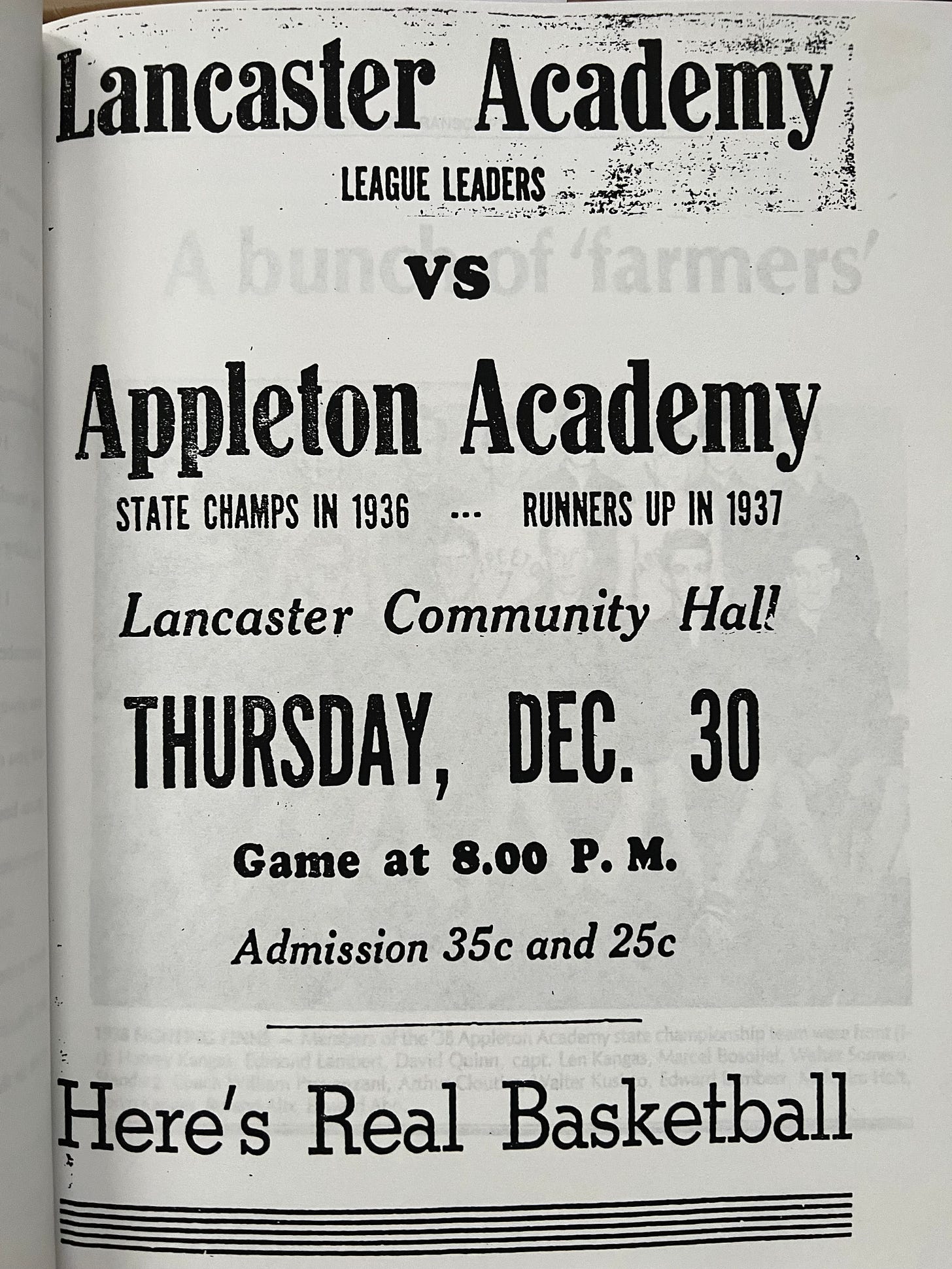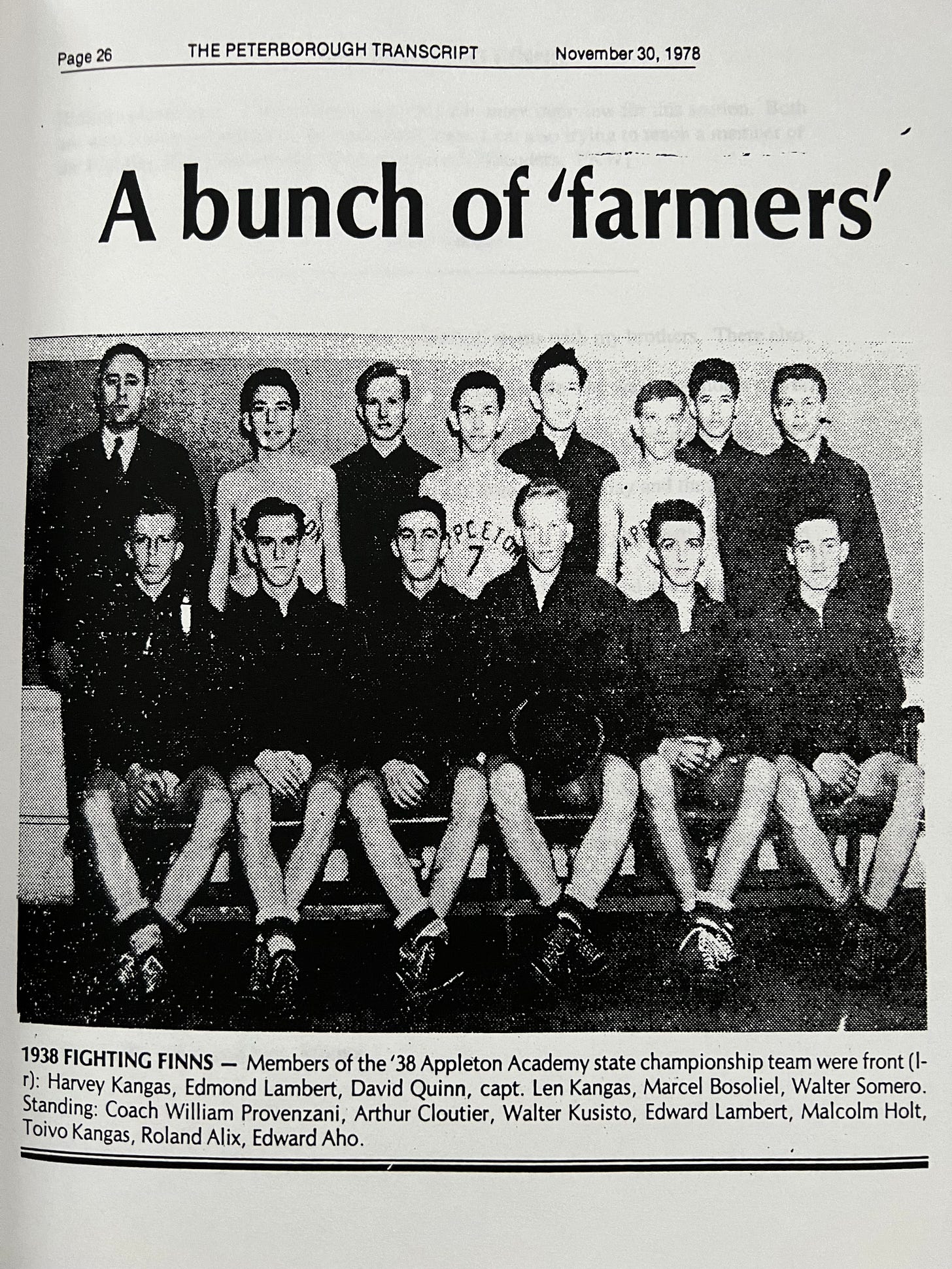FINNS: An Oral History of Finnish-Americans in New Hampshire’s Monadnock Region
Excerpted from FINNS: An Oral History... by Patricia Kangas Ktistes, 1997, all rights reserved.
Mrs. Harold Clukay
The Peterborough Hilanders had a very fine rivalry with the Flying Finns. The kids from Peterborough respected kids from Appleton. We called them the Flying Finns—it was not derogatory—it was just that they were so quick and they never let down. Peterborough also had a rivalry with Conant High School, but that was not of the same caliber. I think it’s because the Appleton players were good and they played hard, but they played clean. It was very intense. Fierce; but not vicious. There’s a difference. My late husband Harold came from Dublin. Then when he went to high school in Peterborough, he was tall for his age and went out for basketball. My brother, who was older, tended to be critical, but I remember him telling about this Harold Clukay who was pretty awkward. But he said, “I think he has great potential, you know.” And it was so unlike my brother to say anything flattering about anybody else. I just loved Harold even then. He wasn’t that tall: 6’2” or 2 1⁄2” and not what I would have called a graceful player. I always thought, even when we were in high school, when I’d see him play, that he was a workhorse rather than a racehorse. He just was always there. I think all the boys who played against him liked him. He loved playing against the Finns; loved them all. ‘Course, Dublin had Finnish children; Harold grew up surrounded by Niemela kids, Kosekela kids, Lahti kids, Korpi kids. It was a very nice relationship. Harold every once in awhile would come out with some Finnish phrase and I’d say, “What are you talking about?” and he’d say some of his ‘Finn friends said it.’ I don’t know whether it was good or bad. The rivalry between Peterborough and Appleton was already in place before the era of the Flying Finns because my brother was a basketball player and played against Vernor Korpi from New Ipswich. Vernor was handsome man and went on to be a basketball referee; a very fine referee. Has anybody told you about the hall that the Appleton boys played in? The showed you how much ability and determination these boys had; how they overcame obstacles. The Appleton kids played an entirely different kind of game because the ceiling in the hall where they practiced was so low they would shoot right straight for the backboard. They never arched the ball. Because if you arched the ball, it would hit the ceiling and be out-of-bounds. And that was a great advantage to the Flying Finns because they knew exactly how to play the backboards. They’d just shoot that ball and it would go right out straight and hit the backboard and drop in. They had it perfected. The first time I went into that hall, I thought it was quite remarkable that a group of boys would practice there. There was a big old stove, kind of a tin stove, in the corner and they had wire around it so that nobody would get hurt, but that was the heat in the hall. Boy, it was crowded! If you wanted to go to a game in New Ipswich, you left early. If you didn’t, you were hanging from the rafters. People who got there too late would just stay outside and wait for news of the game. When the Appleton team came to play in Peterborough, they still did not arch the ball as other teams would. But somehow they managed to win a lot. I think Peterborough had great respect for the fact that these boys could overcome playing in that hall in New Ipswich. You couldn’t say it was barn- like: it wasn’t even big enough to be a barn. I don’t think it was regulation-size. But then there was great diversity in the size of courts that young people played on everywhere in those days. They didn’t complain; everybody was just so happy to play. The rivalry between Peterborough and Appleton was an entirely different atmosphere from that between Peterborough and Jaffrey, which wasn’t friendly: it was more like they were out for blood. The audiences were not friendly. Whereas the audiences between Peterborough and New Ipswich: you can’t really say that it was a mutual admiration society, but it was along that line. A spirit of goodwill and respect for competence both ways. The only player from the Peterborough team who was not liked, I think, by the boys from Appleton was Eddie Blanchette; he was a clever player. He lived in Greenville and I think the Appleton boys resented him because he hadn’t gone to their school, where most boys from Greenville attended. Herbie Holmes was the only Finnish boy from Dublin that I remember who went to Peterborough High School and played basketball against the Flying Finns. His last name wasn’t Finnish, but it had been changed. Nineteen-thirty-five was the year that Appleton beat Peterborough for the championship. When the Peterborough team went to Durham to the tournament, the town was sort of evacuated. There wasn’t anybody left in Peterborough. The feeling in Peterborough when Appleton beat us that day was very sad. ‘Course back in those days, this was when they had the jump center. After every period, the centers would get to the middle of the court and jump for the ball. Harold played all through high school and then won a scholarship to Cushing Academy for a year. It was after graduation; a college prep year. He had a Finnish friend at Cushing; he was best man at our wedding. Tauno Saari from New Ipswich: he was a handsome boy. It was a very fine friendship. Tauno was a great pitcher. Harold and Tauno went to Florida to a baseball school for six weeks in Orlando. After Tauno left Cushing, he went to the University of Vermont and pitched there. Harold had on a pair of white flannel pants when we drove up there one Sunday and this was in the Depression days. We had two or three flat tires on the way up to Burlington and his white flannel pants were a mess, but we were going to see Tauno pitch. I also went to Concord College of Business with a girl named Elma Kolehmainen from New Ipswich. We never thought of Finnish classmates as “Finn kids;” they were part of us. To come to high school in Peterborough, Finnish girls in Dublin would work for a family and receive room and board so they could stay and attend school. They would take care of the children and do dishes and I thought they were worked much too hard by Peterborough families. It was during the Depression. I think it was the greatest time of all to grow up. It made us more aware of monetary and spiritual values. I wish young people today could have what we had. People were kinder to one another: in school there were children whose parents were out of work and they didn’t have anything. And there were some who had everything and yet the ones who had the most never flaunted it. They never tried to have things that the others couldn’t afford to have and I thought that was good.





My Dad often talked about Harold Clukay. He had a lot of respect for him and his ability to play basketball. Great information. I love reading these interviews.